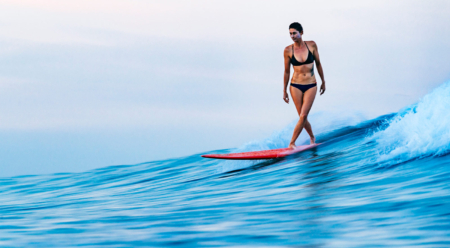Surfing and Making Sustainable Clothing on the Island of Serendip
Almost a decade ago, I’d heard stories of mystical right points peeling forever without another soul in sight. What surfer addicted to logging wouldn’t crave to check it out, even though it meant ignoring travel warnings and venturing into a region suffering from civil unrest?
Young, naive and most probably foolish, I set off on a journey with a few friends and scored some of the best waves of my life in Arugam Bay, a sleepy fishing village on the southeast coast of Sri Lanka. It was a year after the Indian Ocean tsunami of 2004, and the area had only recently reopened to the general public after suffering through years of armed conflict.
Military checkpoints were frequent. Waking up from a car nap with an AK-47 pointed at our heads while being questioned about what we were transporting on the roof was enough to make me think that the trip was a mistake. But after explaining there were only surfboards on top of the car, we were bid farewell with smiling faces and shaka signs. I’d say that was a fair summary of the Sri Lankan people—in the middle of a war, they were still sharing smiles.
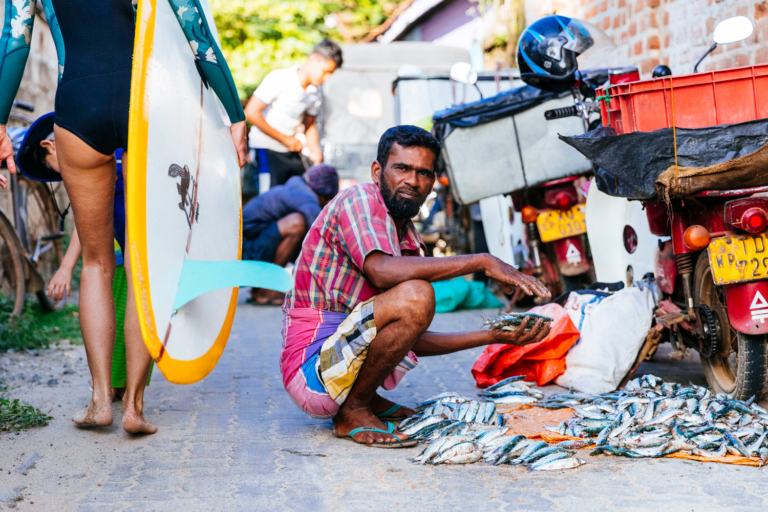
A local fisherman with his morning catch. Photo: Jarrah Lynch
This past fall, I finally had a chance to return to the island once known as Serendip—to surf those mystical points again, but also to visit a Fair Trade Certified factory where Patagonia surf gear is produced. As a small crew of us flew into Colombo, the country’s capital, it seemed that not much had changed—the traffic was still extreme and the streets were still busy, but somehow the chaos of an overcrowded city still seemed to work in rhythmic motion.
Patagonia makes a number of Fair Trade Certified products in factories situated on the outskirts of this 5.6-million-person metropolis. Before I’d become more aware about the garment industry through my work as a Patagonia surf ambassador, the ethics of production had never been an issue to me; I’d never thought to question where my clothes came from. I’d learned more over the past few years, but as we walked through one of our source factories on the first day of our visit, I knew the chance to see the mastery of thousands of hands at work was something special. For the first time, it struck me that these were hands that mothered families, supported children and loved parents.
As consumers, we pay for quality, we pay for prestige, and we pay for lower environmental impacts. So why wouldn’t we make equivalent choices to help others earn a living wage and work in safe conditions? Walking through the factory made me rethink my consumption and question all the other products I’d bought over my lifetime. It left me determined to speak out, loudly and clearly, in support of Fair Trade.
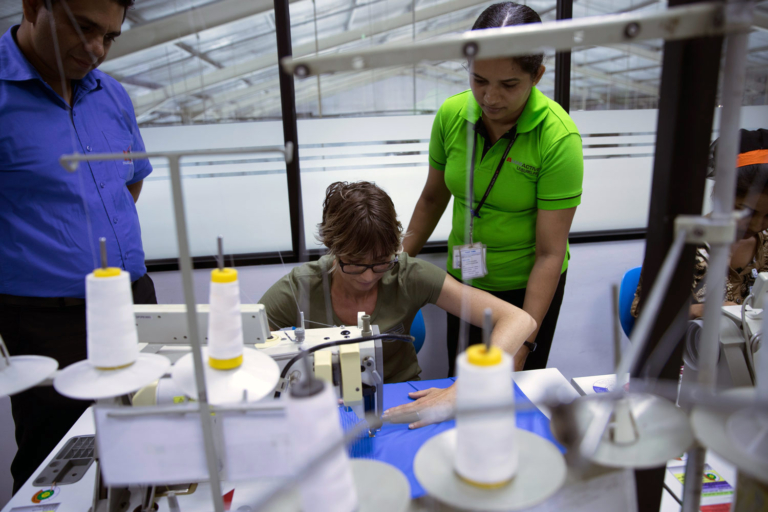
Belinda gets a sewing lesson at MAS Active-Leisureline in Sri Lanka. We partnered with the factory to help it become a Fair Trade Certified facility. Photo: Jarrah Lynch
The next day, on our way to the surf, we stopped at a hevea rubber plantation—one of two plantations where Patagonia sources natural rubber for wetsuits. Greeted by a Tamil ceremony, my 5-year-old son, Rayson, went into the schoolroom to play. The children were timid at first, but after a few games and laughs, I saw how communication knows no boundaries when it comes to the universal language of play.
Patagonia only uses rubber from sources that are Forest Stewardship Council certified by the Rainforest Alliance—plantations where great care is taken with the trees and the land. Reflecting that approach, the trees themselves were beautiful, well-established and stretched as far as I could see. Watching the trees get tapped and the latex roll and tumble into cups was amazing; I caught a drip and marveled as it turned solid in my fingers. Just as in the factory the day before, I was finally making connections to where my surf gear really began. Walking through the forest, I realized that I would wear rubber from these trees in the ocean someday, in wetsuits whose main ingredient was grown from seed.
That night, our overnight journey through the hills was long and uncomfortable, but the ocean was calling our names. Nathan Oldfield was on the back seat; Dave Rastovich was wedged on the floor; and Jarrah Lynch, Rayson and I somehow created a Jenga puzzle of limbs on the middle seat. Waking from a dream, I saw a psychedelic elephant dressed in lights being led down the road with a parade following behind; I couldn’t quite decide if I was just that tired, or if the elephant was real.
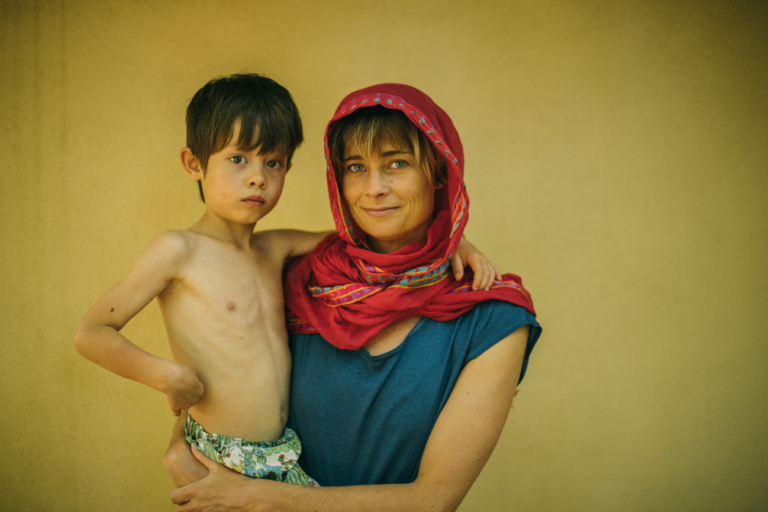
Rayson and Belinda. Photo: Nathan Oldfield
As the sun rose we reached the coast, and in the humid air I drifted off again to sleep. By 9 a.m., the sun was an inferno, and I quickly realized that skipping the early surf session was a mistake. From my first visit in ’05, I didn’t remember the heat being this intense. Setting out for a walk, I saw that the main street was lined with cafés, hotels and “Learn to Surf” signs. It’s paved now, and crowds of European tourists lined the beach—nothing like I remembered.
The next day, we stacked boards on the tuk tuk and beat the heat to a faraway pointbreak. Away from the tourist strip, I found that the serenity of the Indian Ocean hadn’t changed. With small waves peeling perfectly down a sandy point, it really was longboard heaven—long walls tapered down the line, and if positioned correctly, you could get one of the longest noserides of your life.
The early start became a routine for the next week, and we continued on our quest of dodging crowds at an endless array of right points. Most days, fun was high on the agenda: longboard, shortboard, egg, fish, no board, ride your mate and—my favorite—piggyback surfing with Rayson. By 10 a.m., our makeshift shade tents couldn’t keep us protected from the harsh sun, and we’d retreat to a new friend’s café for the best local food, ice cold drinks and a lazy swing in the hammock.
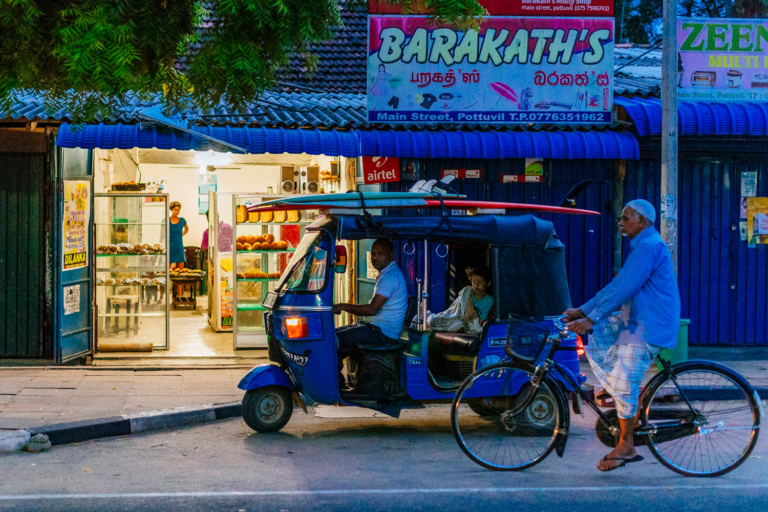
Belinda makes a morning bakery stop while Rayson waits in the tuk tuk. Photo: Jarrah Lynch
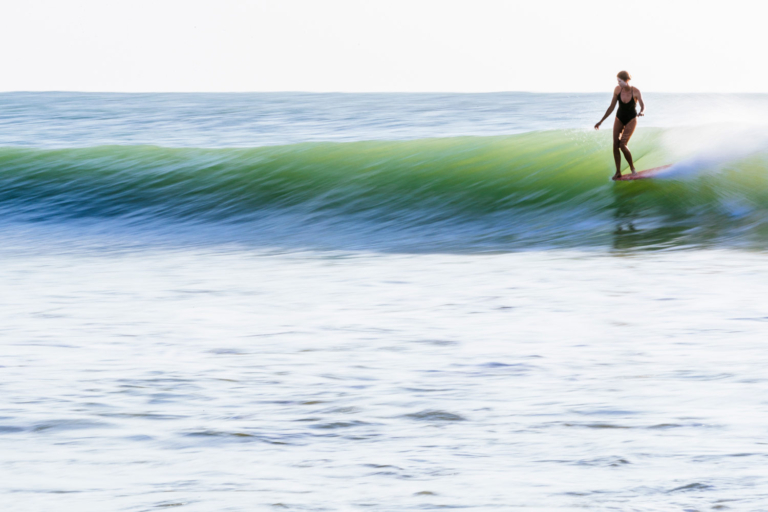
“It really was longboard heaven. If positioned correctly, you could get one of the longest noserides of your life.” Photo: Jarrah Lynch
A week later, the swells started to diminish and clouds began to fill the sky—the rainy season was approaching, and our adventure was drawing to a close. Packing up, I found two scorpions had taken up residence in my longboard bag, and I quickly evicted them before packing away my beloved quiver.
Chasing a trail of dust back to Colombo, I reminisced on the time we’d spent here. Many things had changed since my last visit—but, above all else, the waves and smiles of the locals had stayed the same.
